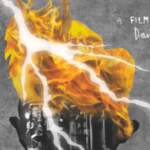 Our World
Our World  Our World
Our World  Crime
Crime 10 Dark Details of the “Bodies in the Barrels” Murders
 Animals
Animals The Animal Kingdom’s 10 Greatest Dance Moves
 Movies and TV
Movies and TV 10 Box Office Bombs That We Should Have Predicted in 2025
 History
History 10 Extreme Laws That Tried to Engineer Society
 History
History 10 “Modern” Problems with Surprising Historical Analogs
 Health
Health 10 Everyday Activities That Secretly Alter Consciousness
 History
History Top 10 Historical Disasters Caused by Someone Calling in Sick
 Animals
Animals 10 New Shark Secrets That Recently Dropped
 Movies and TV
Movies and TV 10 Forgotten Realities of Early Live Television Broadcasts
 Our World
Our World 10 Places with Geological Features That Shouldn’t Exist
 Crime
Crime 10 Dark Details of the “Bodies in the Barrels” Murders
 Animals
Animals The Animal Kingdom’s 10 Greatest Dance Moves
Who's Behind Listverse?

Jamie Frater
Head Editor
Jamie founded Listverse due to an insatiable desire to share fascinating, obscure, and bizarre facts. He has been a guest speaker on numerous national radio and television stations and is a five time published author.
More About Us Movies and TV
Movies and TV 10 Box Office Bombs That We Should Have Predicted in 2025
 History
History 10 Extreme Laws That Tried to Engineer Society
 History
History 10 “Modern” Problems with Surprising Historical Analogs
 Health
Health 10 Everyday Activities That Secretly Alter Consciousness
 History
History Top 10 Historical Disasters Caused by Someone Calling in Sick
 Animals
Animals 10 New Shark Secrets That Recently Dropped
 Movies and TV
Movies and TV 10 Forgotten Realities of Early Live Television Broadcasts
10 Actors Who Got Paid for Films They Weren’t In
Actors are some of the most well-compensated members of society, or at least those who make it to Hollywood are. And all actors who work on Screen Actors Guild movies (which is pretty much everyone in Hollywood) get paid, whether they appear in the finished product or not. Thanks to pay-or-play contracts, many top-tier actors get a check even if they don’t actually work at all.
But the reasons actors end up not starring in movies they’ve been paid for are many. Some are cut out of films, some get fired before the director has ever called action, and some, perplexingly, never have anything to do with the production in the first place.
Related: Top 10 Successful Movies Everyone Expected To Fail
10 Shailene Woodley, The Amazing Spider-Man 2
Before Tom Holland donned the red spandex, Andrew Garfield was the world’s principal web-swinger in a film series that began with The Amazing Spider-Man in 2012 and ended with The Amazing Spider-Man 2 a mere two years later. Garfield’s fifteen minutes of Spidey fame have been looked upon more fondly in recent years, but some of the series’ stars didn’t even get fifteen seconds!
Shailene Woodley, best known for the Divergent series, signed on to play Mary-Jane Watson in the second Amazing Spider-Man, but her feet hardly touched the ground before she was whisked out the door again. Director Marc Webb (the puns write themselves) shot three scenes with the actress, intending MJ to be a minor presence and secondary romantic interest for Garfield’s Peter Parker. But ultimately, he decided to leave her parts on the cutting room floor when streamlining an already 142-minute movie. Even though her time on set was brief, and the public never got to see the actress on screen, Woodley still got paid for paying her dues.[1]
9 Johnny Depp, Fantastic Beasts: The Secrets of Dumbledore
The third installment in the Fantastic Beasts series, The Secrets of Dumbledore, exploded onto screens in 2022, but most of the series’ magic had already evaporated. The writing was lax, the film felt superfluous, and several public controversies plagued the film, including Potterverse author and Fantastic Beasts screenwriter JK Rowling’s ongoing friction with some of the trans community. But few controversies were as large as the domestic abuse allegations made by Amber Heard against Johnny Depp (who starred as antagonist Gellert Grindelwald in the first two Fantastic Beasts films) and the subsequent libel case that he lost against UK tabloid newspaper The Sun.
Seeking to cut their losses and save face following the outcome of the court case, in which the judge found that 12 of the 14 domestic abuse allegations had occurred, Fantastic Beasts studio Warner Bros. cut ties with Depp and hired Mads Mikkelsen to replace him. Lucky for Depp, he had only filmed one scene for The Secrets of Dumbledore; unlucky for Warner, he had a pay-or-play contract entitling him to his full salary for the film—an eye-watering $16 million.[2]
8 Bob Hoskins, The Untouchables
The production for Brian De Palma’s The Untouchables, a film about the team who took down Al Capone, brought together four of the 20th century’s biggest acting talents in Sean Connery, Kevin Costner, Robert De Niro, and Andy Garcia. The film has gone down in history as one of the best crime films set in the Prohibition era.
While the entire cast is pitch-perfect, De Niro’s Al Capone is a particular highlight, with the veteran gangster actor carrying off both the physicality and voice of Capone with ease. Though De Niro was the first choice for the part, the actor was in high demand, and De Palma hedged his bets by getting English actor Bob Hoskins to agree to take the role if De Niro couldn’t make it. When De Niro took the part, Hoskins thought nothing of it until a check for $200,000 arrived in the mail with a note saying, “Thanks for your time. Love, Brian.”[3]
7 Paul Rudd, Bridesmaids
It’s not often a big-name actor gets cut from a film for little to no reason, but that’s precisely what happened during the editing process for Paul Feig’s 2011 all-star smash hit comedy Bridesmaids. Bringing together comedians from SNL, various comedy shows, and the films of Judd Apatow (who served as producer on Bridesmaids), the film is a who’s-who of the U.S. comedy scene at the turn of the decade.
But some of its best comedic talent didn’t even make it onto the screen. Paul Rudd was originally set to cameo in the film as protagonist Annie’s (Kristen Wiig) blind date, who loses touch with reality when a child skates over his fingers. Rudd shot with the crew for a day and, by all accounts, threw himself into a sequence that saw him pratfall across an ice rink and swear liberally at children. But in terms of screen time, it amounted to nothing, as Feig cut him from the film to keep the narrative tight and give more screen time to child actor Blake Garrett who was, by all accounts, comedy gold. Thanks to the Screen Actors Guild, though, Rudd still got paid.[4]
6 Kevin Spacey, All the Money in the World
Fantastic Beasts was not the first film to drop an actor thanks to controversies going on away from the set, but few films have gone as far as All the Money in the World did when it comes to eradicating a star from the celluloid. Filming had completed, and the film was in the end stages of post-production when sexual misconduct allegations were made against star Kevin Spacey by fellow actor Anthony Rapp.
Recognizing that this could sound the death knell for his film, director Ridley Scott sprang into action, used his industry clout to secure an extra $10 million in financing, and hired Christopher Plummer to replace Spacey as billionaire oil tycoon J. Paul Getty. They filmed an additional 400 shots over nine days in two countries, and Scott used digital and practical effects teams extensively to help blend the new actor into the existing picture. As Spacey had completed his work on the film and fulfilled his contract, both actors ended up getting paid despite only one appearing in the final film.[5]
5 Tim Roth, Once Upon a Time… in Hollywood
Once Upon a Time… in Hollywood broke many of director Quentin Tarantino’s long-established tropes and filmic traditions, serving up a tale about the Manson family murders that contained surprisingly little violence and more tension and meditative contemplation than merchandisable quick quips. One of the telltale signs of a Tarantino flick, however, was the presence of a familiar cast of actors, bringing together Leonardo DiCaprio, Brad Pitt, Kurt Russell, Bruce Dern, and others from the director’s previous features.
Conspicuously absent, however, was Tim Roth—who has been with Tarantino since Reservoir Dogs—despite being paid to be in the film. Roth filmed sequences as Hollywood hair stylist Jay Sebring’s (Emile Hirsch) British butler, serving little more than a cameo role, which is ultimately why Tarantino decided to drop his part altogether. Given the film is already nearly three hours long, perhaps it’s a good thing he did.[6]
4 Tobey Maguire, Life of Pi
It’s not often you end up being booted from a film for being too well-known, but that’s what happened to Tobey Maguire in Life of Pi. Ang Lee’s adaptation of Yann Martel’s Booker Prize-winning novel sees a young Indian boy, Pi (Suraj Sharma), stranded in the middle of the Pacific Ocean aboard a lifeboat with only a tiger named Richard Parker for company. In the film, the story is told by a grown-up Pi (Irrfan Khan) to a fictionalized version of the author, known only as The Writer.
Tobey Maguire was originally on board to play the fictionalized Martel, but after filming had begun, Lee didn’t feel Maguire was a good fit for the part and replaced him with the far less recognizable Rafe Spall. It should come as no great surprise that Lee changed his mind to “be consistent with other casting choices made for the film” because the majority of the cast, save perhaps for Gérard Depardieu’s Cook, were not as well known to Western audiences.[7]
3 Harrison Ford, E.T. the Extra-Terrestrial
There isn’t an adult or child across the established world who doesn’t associate the name Steven Spielberg with his family-friendly alien flick E.T., but back when it was being made, the director was better known for more adult-oriented films like Jaws, Close Encounters of the Third Kind and Raiders of the Lost Ark. It makes sense then that he wanted to carry over some of what he knew from those films into this, and while subject parallels with the likes of Close Encounters are easy to draw, E.T. doesn’t bear a whole lot of resemblance to Indiana Jones.
Nonetheless, Spielberg’s filmmaking comfort food in this feature was Harrison Ford himself. The director cast Ford against type as an uptight school principal who reprimands young protagonist Elliott (Henry Thomas) in his office. Shot over Ford’s shoulder and in dim lighting, this cameo was always meant to be an Easter egg for fans, but it didn’t make it into the film at all.
A notoriously unsentimental editor, Spielberg didn’t think the scene added anything to the film and left it on the cutting room floor. While details of the sum Ford actually got paid are scarce, it wouldn’t have been spare change, given he was just concluding a run starring in Raiders, The Empire Strikes Back, and Blade Runner.[8]
2 Michael Biehn, Alien 3
David Fincher’s Alien 3 received a lambasting from fans and critics upon release for a multitude of reasons. The film didn’t serve the series trajectory well, the studio interfered in the process throughout and refused Fincher’s final cut, and above all else, James Cameron’s and Ridley Scott’s (director of the first two Alien films) footsteps were awfully big for a first-time director to follow in.
Among the film’s issues was the killing of legacy characters Newt (Carrie Henn) and Hicks (Michael Biehn) at the beginning of the film when an alien egg hatches on board their ship, and their escape pod crashes into a nearby planet. Neither Biehn nor Henn had signed on for another film, so Fincher couldn’t use the actors, but the production team initially worked with a facial cast of Biehn taken in Aliens to create a prosthetic doppelganger. Biehn got wind of this and put his agent onto the studio, saying they couldn’t use his image. Ultimately, he agreed to let them use his likeness, but only for a hefty fee.[9]
1 Eric Stoltz, Back to the Future
Back to the Future remains one of the foremost time travel sci-fi films of the 20th century, and its conception of time travel has come to be the go-to exemplar for the single, alterable timeline, in which changes to the past affect changes in the future. As a result, Back to the Future deals with the idea that if we went back in time and changed things, we might end up accidentally erasing ourselves. Unfortunately for Eric Stoltz, his approach to Robert Zemeckis’s script resulted in him being erased from the production.
Originally cast as teen hero Marty McFly, Stoltz brought an air of melancholy and darkness to the role, treating the part as a tragedy rather than the family-friendly comic stylings Zemeckis had in mind. Not getting laughs from the dailies and concerned that this casting decision could sink the whole film, Zemeckis opted to fire Stoltz six weeks into filming, costing the studio two actors’ salaries and adding millions of dollars to the budget. But Michael J Fox took over as McFly, and the rest is history, or the future, or something like that…[10]








